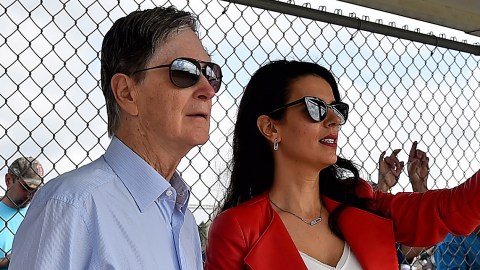Statistics are fun. Derek Jeter's 3,000th hit, which attracted so much attention two weekends ago, wouldn't have been possible if not for the guys who compiled the numbers over the years. While some new-age statheads may gripe about the importance of hits, there's no denying it was a nice moment, even from a Red Sox fan's perspective.
A lot of the advanced statistics are useful, too. On-base percentage is widely accepted as the single most important offensive measure, and if it weren't for WHIP, Felix Hernandez doesn't deservedly win the 2010 Cy Young Award. In general, anything that helps us better understand the game we love is worthwhile.
On occasion, though, there's a list that makes it very difficult to take certain stats seriously.
According to a somewhat advanced defensive metric known as range factor, Red Sox second baseman Dustin Pedroia is the 14th best defensive second baseman in Major League Baseball. He's 13 spots below leader Mark Ellis, nine spots below Cubs rookie Darwin Barney and three spots below Dan Uggla.
Any stat that implies for a millisecond that Uggla is better than Pedroia at anything should be retroactively deleted from existence.
To be sure, not every sabremetrician swears by range factor. It's more than three decades old, but many fans don't know how to calculate it (successful chances plus innings multiplied by nine). It doesn't really measure fielding ability, but the number of balls hit to a fielder. It's flawed, to say the least.
Still, it's a statistic people use to evaluate players defensively. Click over to zone rating, which measures how many plays a fielder makes on ball hit into his "zone," and Pedey does better; he's fourth. Check out the traditional (yet equally flawed) fielding percentage and he's fifth.
That's better, but it's well short of the eye-popping, Gold Glove caliber stuff Red Sox fans see from Pedroia every day. It would be interesting to see where defensive artists such as Ozzie Smith or Brooks Robinson would rank in range factor or zone rating. Advanced statisticians claim they can't go back and evaluate defense from the past; the feeling here is that they're simply afraid their stats will come back with some absurd result that says Smith or Robinson were poor defenders, which would immediately render these advanced metrics laughable.
Thankfully, ultimate zone rating tells a truer story. In UZR, which assigns a run value to a player's defense (although good luck figuring out how to calculate it), Pedroia is the runaway leader. But keep in mind this is the same statistic that last year claimed Jacoby Ellsbury was a terrible outfielder.
Stats provide the basis for all baseball arguments, because everyone views them in a slightly different way.
For instance, for many fans the debate about who's the greatest non-steroid aided home run hitter is easy. Hank Aaron and Babe Ruth have the most homers, so the title is indisputably theirs.
Other fans, though, look at the time lost by hitters such as Ted Williams and Willie Mays due to military service and imagine either of them reaching at least 755 home runs.
Ideally, all baseball arguments run along these same lines. One side presents the hard data while another side explains the extenuating circumstances.
But some stats, even some of the advanced stats so many seem to have fallen in love with the last few years, completely miss the point.
Pedroia is a great defensive second baseman. That's obvious by watching him. Any stat that says otherwise is a stat that needs to be retired.



